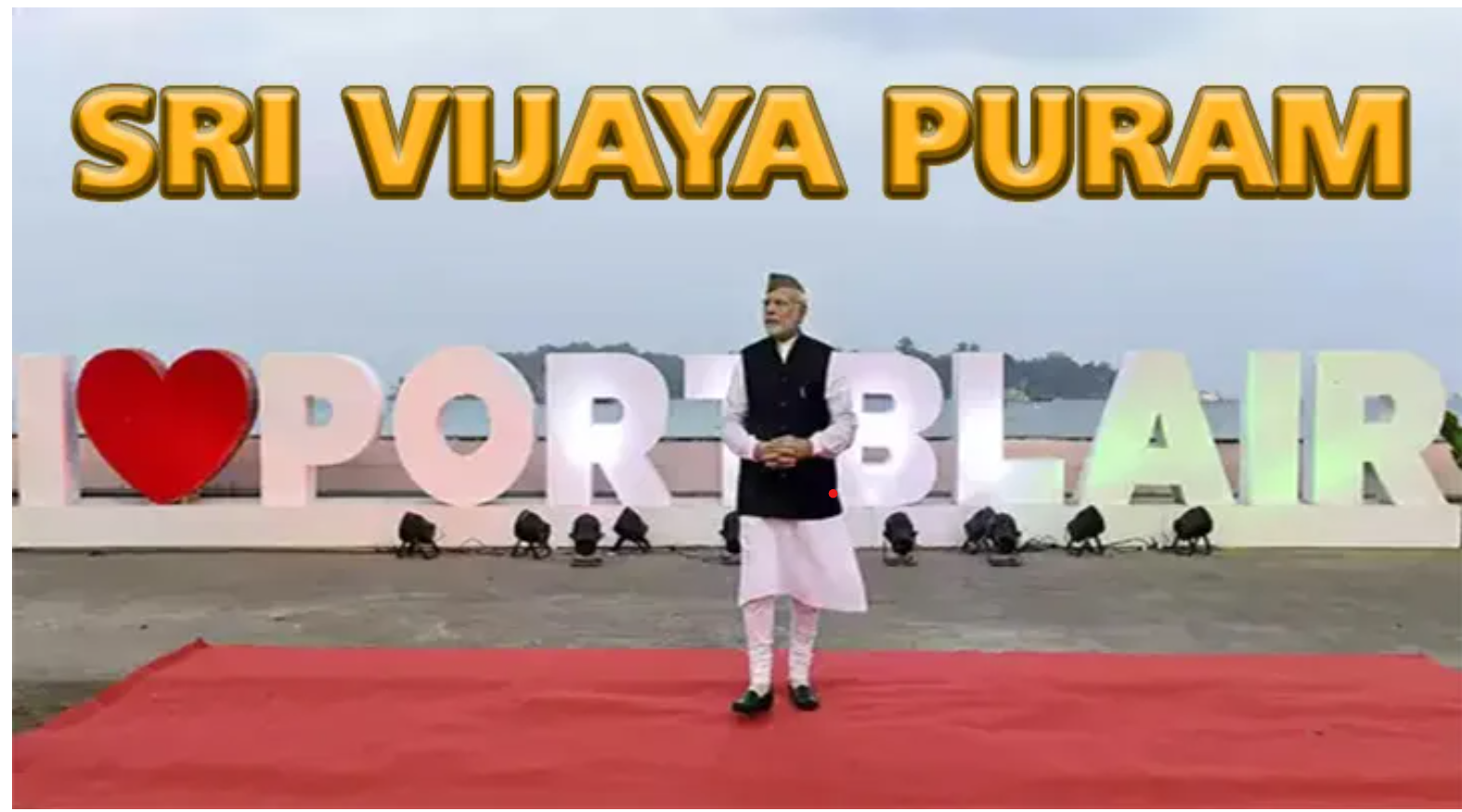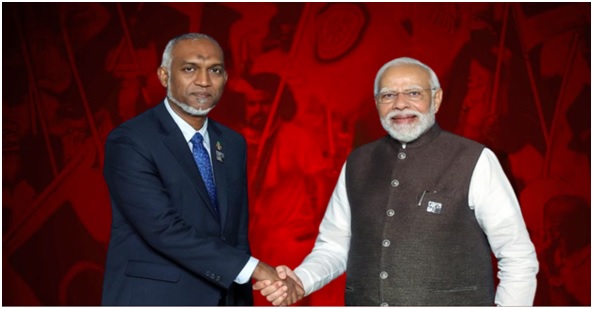Port Blair renamed as Sri Vijaya Puram

- 14 Sep 2024
Port Blair to be Renamed Sri Vijaya Puram: A Move to Erase Colonial Echoes
Union Home Minister Amit Shah announced on Friday that Port Blair, the capital city of the Andaman and Nicobar Islands, will be renamed Sri Vijaya Puram. This decision is part of a broader effort to “free the nation from colonial imprints,” Shah explained. In a post on X, he emphasized that while the current name carries colonial connotations, the new name, Sri Vijaya Puram, represents the triumph of India's freedom struggle and acknowledges the Andaman & Nicobar Islands’ pivotal role in that struggle.
Shah further highlighted the strategic importance of the islands, which historically served as a naval base for the Chola Empire and are now envisioned as a key element in India’s strategic and developmental plans. Port Blair, named after British naval surveyor Archibald Blair, will henceforth be known as Sri Vijaya Puram, aligning with Prime Minister Narendra Modi’s vision to remove colonial legacies.
The Origin of Port Blair’s Name
Port Blair, the gateway to the Andaman and Nicobar Islands, was named after Archibald Blair, a lieutenant in the Bombay Marine. Blair conducted a thorough survey of the islands after joining the Bombay Marine in 1771. His expedition, which began in December 1778, was crucial in mapping the Andaman Islands. Initially, Blair named the natural harbor Port Cornwallis, in honor of Commodore William Cornwallis. Later, the harbor was renamed Port Blair.
Blair’s survey was highly valued by the East India Company (EIC), leading to the islands’ colonization. The primary motivation was to create a secure harbor to monitor Malay pirates and provide refuge for shipwrecked individuals. Over time, the islands were established as a penal colony, receiving numerous convicts who performed forced labor.
In 1792, the EIC relocated the colony to Port Cornwallis, but it was soon abandoned due to disease and high mortality rates. The Revolt of 1857 brought an influx of prisoners, leading to the reestablishment of Port Blair as a penal colony. The harsh conditions led to numerous deaths, and the area became notorious for its brutal treatment of prisoners, including freedom fighters like Veer Damodar Savarkar. The infamous Cellular Jail, or Kaala Paani, was built by 1906 to house political prisoners.
Historical Significance of the Andaman Islands
Historical records indicate that the Andaman Islands were strategically significant during the 11th century, particularly for the Chola Empire under Emperor Rajendra I. The islands were used as a naval base in the Chola campaign against Srivijaya, a kingdom in present-day Indonesia. An inscription from Thanjavur dating to 1050 CE refers to the islands as Ma-Nakkavaram land, which may have influenced the modern name Nicobar.
Historian Herman Kulke, in his book "Nagapattinam to Suvarnadwipa," describes the Chola invasion of Srivijaya as a notable event, reflecting the complex interactions between India and Southeast Asia. Various scholars offer differing interpretations of the invasion, ranging from a response to trade disruptions to an extension of Chola expansionism.
In summary, the renaming of Port Blair to Sri Vijaya Puram represents a significant shift in recognizing the historical and strategic importance of the Andaman and Nicobar Islands, aligning with India's broader goals of addressing colonial legacies and honoring its rich history.
India-Maldives Relations Amidst Chinese Influence (Indian Express)

- 14 Oct 2023
Why is it in the News?
Following the recent presidential elections in Maldives, there are concerns about the potential impact on India-Maldives relations due to the 'India-Out' campaign led by President-elect Mohamed Muizzu.
Context:
- The recent election in Maldives resulted in the victory of a candidate perceived as Pro-China for the presidential role, sparking apprehensions for India.
- Maldives had a historical shift from an Executive Presidency system dating back to 1968 to a multi-party democracy in 2008.
- The absence of a re-elected incumbent president since 2008 is causing concern for India on this occasion.
Geographical Bonds Between India and Maldives:
- The Maldives is an archipelago spread across 90,000 square kilometres, predominantly comprising 99.6% of the ocean, leaving the remaining land scattered among over 1,200 islands.
- A concerning forecast by experts suggests that by 2050, 80% of the Maldives may face submersion due to the effects of 'Global Boiling.'
- In this geographical tapestry, India emerges as the closest neighbour, positioned just 70 nautical miles away.
- In times of crisis, it is India alone that stands as Maldives' immediate and unwavering ally.
- The profound words of Ibn Khaldun, the Tunisian philosopher, find resonance in the destiny woven by geography between these two nations.
- As he asserted, geography plays a pivotal role, and in the case of India and the Maldives, it s
How Has India Assisted the Maldives in the Past?:
- Essential Support and Communication Dependence: Historically, Maldives has leaned on India for essentials and communication, with India standing as a consistent and indispensable factor in the island nation's development.
- Even during the British protectorate years (1887-1965), Maldives relied on India for essentials and as a gateway to the outside world.
- State Bank of India's Role in Tourist Economy: India played a pivotal role in shaping Maldives' tourist economy, with the State Bank of India serving as a major financier in building the foundation of the country's tourism sector.
- This enduring support positions the State Bank of India as the largest bank in the Maldives to this day.
- Non-Interference in Internal Developments: Crucially, India has refrained from interfering in Maldives' internal affairs, offering support during critical moments such as the attempted coup in 1988 and subsequent assistance in various forms over the decades.
- The profound dependence of Maldives on India, coupled with India's unconditional support, has played a pivotal role in the island nation's emergence as the highest per capita country in South Asia.
- India's Prompt Response in Crises: During three major crises in 1988 (coup), 2004 (tsunami), and 2014 (water shortage), India emerged as the first responder, exemplifying its commitment to Maldives' well-being.
- Critical Role of Indian Professionals: In education and health, Indian teachers and doctors continue to play crucial roles, extending their influence even to remote inhabited islands.
- Strategic Defense Cooperation: The strategic defence cooperation between India and Maldives goes beyond material assistance, focusing on capacity building through joint exercises like Ekuverin and Ekatha, as well as collaboration in surveillance assets, training 1,400 MNDF trainers in recent years, and disaster management efforts.
What is the Current Situation of India-Maldives Bilateral Relations?
- India stands as the predominant partner in various sectors, be it trade or tourism.
- Demonstrating commitment to elevating Maldives' infrastructure, India is actively engaged in projects such as enhancing connectivity in Greater Male.
- India plays a vital role in supplying a diverse range of essential commodities in bulk, including rice, wheat flour, sugar, potatoes, onions, eggs, vegetables, and even special dispensations like river sand and construction materials.
India's Strategic Interests in Maldives:
- Strategic Significance: Maldives holds paramount importance for India as a primary line of defense against various threats, including terrorism, piracy, drug trafficking, narcotics, and maritime crimes.
- Geographically, Maldives is strategically positioned merely 70 nautical miles from Minicoy and 300 nautical miles from India's West coast.
- It serves as a pivotal point within the commercial sea lanes traversing the Indian Ocean.
- Geo-Political Alignment: India's interests in Maldives align on various fronts, encompassing:
- Securing sea lanes of communication.
- Combating piracy and sea-based terrorism.
- Transforming the Indian Ocean into a conflict-free zone, restoring its status as a peaceful maritime region.
- Exploring the potential of the blue economy and enhancing trade relations.
- Internal Security Concerns: Maldives' proximity and shared maritime borders have direct implications for India's internal security.
- The upsurge in Maldivians joining terrorist groups, such as the Islamic State (IS), poses a significant challenge.
- Political instability and socio-economic uncertainties contribute to the growth of Islamist radicalism, raising concerns about the potential use of remote Maldivian islands as launch pads for terror attacks against India and its interests.
What are the Challenges to India-Maldives Bilateral Relations?
- Rising Islamic Radicalization: The Maldives has witnessed an alarming increase in per capita numbers of individuals joining foreign terrorist groups in Syria and Iraq.
- A 2020 report by the European Foundation for South Asian Studies highlights the challenge of growing Islamic radicalization among the Maldivian population.
- India Out Campaign: The India Out campaign, supported by Maldives' opposition leader Abdulla Yameen and the newly elected president, projects a sceptical view of India's investments and defence partnerships.
- Allegations include concerns about compromising the sovereignty of the island nation by allowing Indian military presence, fostering a negative sentiment towards India's role as a net-security provider.
- The China Factor: China's engagement in the region is perceived as self-serving, characterized by debt financing leading to potential debt traps and China's expanding influence.
- Concerns arise over China's interference in Maldives' internal politics and support for conservative elements, posing a threat to the development of a vibrant democracy.
- There are apprehensions that elements aligning with China may perpetuate a legacy of controlled regimes from the Gayoom era, potentially compromising the nation's long-term interests.
Way Ahead for India-Maldives Relations: Detrimental Effects of Anti-India Campaigns
- India remains steadfast in its commitments to the Maldives, consistently investing in efforts to strengthen bilateral relations.
- Any hasty attempts to unravel this carefully nurtured partnership are poised to inflict more harm on the Maldives than on India itself.
- A telling example is the 2012 'GMR out' campaign, which cost Maldives a substantial $270 million payout to GMR.
- The Yameen era, marked by a pro-China policy, plunged Maldives into a debt crisis, underscoring the potential pitfalls of such geopolitical shifts.
Conclusion
Throughout the decades, India has been a reliable source of security assistance for Maldives, extending a hand of friendship and trust. It is anticipated that the newly elected President Muizzu will likely refrain from taking drastic measures that could alter the fabric of relations with India. While elections are often driven by emotions and promises, the pragmatic realities of governance may lead him to recognize the potential repercussions of undermining the longstanding ties with India.
